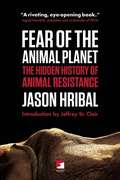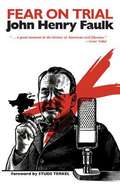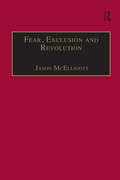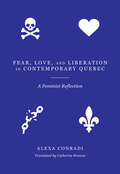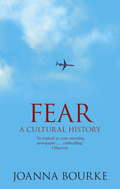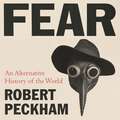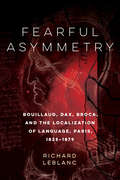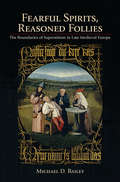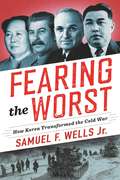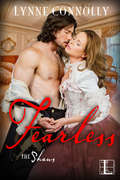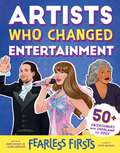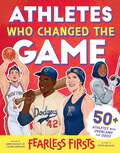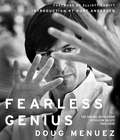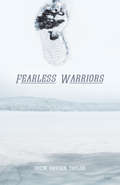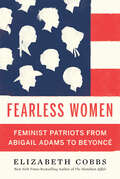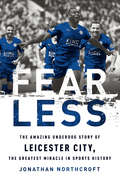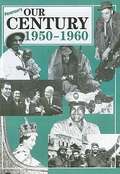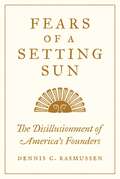- Table View
- List View
Fear of the Animal Planet: The Hidden History of Animal Resistance
by Jason HribalA Siberian tiger at the San Francisco Zoo leaps a 12-foot high wall and mauls three visitors who had been tormenting her, killing one. A circus elephant tramples and gores a sadistic trainer, who had repeatedly fed her lit cigarettes. A pair of orangutans at the San Diego Zoo steal a crowbar and screwdriver and breakout of their enclosure. An orca at Sea World snatches his trainer into the pool and holds her underwater until she drowns. What's going on here? Are these mere accidents? Simply cases of animals acting on instinct? That's what the zoos and animal theme parks would have you believe. But historian Jason Hribal tells a different story. In the most provocative book on animal rights since Peter Singer's Animal Liberation, Hribal argues persuasively that these escapes and attacks are deliberate, that the animals are acting with considered intent, that they are asserting their own desires for freedom.
Fear on Trial: Revised and Updated
by John Henry FaulkThe heart of the book is the trial of Faulk's libel action against AWARE, in which attorney Louis Nizer relentlessly exposed the blacklist for what it was—a cynical disdain of elementary decency couched in the rhetoric of patriotism.
Fear, Exclusion and Revolution: Roger Morrice and Britain in the 1680s
by Jason McElligottBetween the years 1677 and 1691 the Puritan minister Roger Morrice compiled an astonishingly detailed record of public affairs in Britain. Running to almost a million words his 'Entring Book' provides a unique record of late seventeenth-century political and religious history. It charts the rise of British party politics, and the transformation of Puritanism into 'Whiggery' and Dissent. It provides a wealth of information on social and cultural history, as well as the relationships between the three Stuart kingdoms. All the essays in this volume have been inspired by the key concerns of the Entring Book: the palpable sense of the fear and foreboding in the 1680s; the long shadow cast by the mid-century civil war; the profound effect on Englishmen of events on the continent; and the anxieties and opportunities caused by a socially diffuse culture of news and information. In so doing they give a vivid sense of what it was like to live in England in the years before the Revolution and help to explain why that Revolution took place when it did, and why it took the particular form that it did. These chapters provide fresh and insightful perspectives on religion, politics and culture from established and emerging scholars on three continents. Taken together they offer a valuable introduction to the world of Roger Morrice, and will be an essential companion to the scholarly edition of the Entring Book.
Fear, Love, and Liberation in Contemporary Québec: A Feminist Reflection
by Alexa ConradiIn response to rapid and unsettling social, economic, and climate changes, fearmongering now features as a main component of public life. Right-wing nationalist populism has become a hallmark of politics around the world. No less so in Quebec. Alexa Conradi has made it her life’s work to understand and to generate thoughtful debate about this worrisome trend. As the first President of Québec solidaire and the president of Canada’s largest feminist organisation, the Fédération des femmes du Québec, Conradi refused to shy away from difficult issues: the Charter of Quebec Values, religion and Islam, sovereignty, rape culture and violence against women, extractive industries and the treatment of Indigenous women, austerity policy and the growing gap between rich and poor. This determination to address uncomfortable subjects has made Conradi—an anglo-Montrealer—a sometimes controversial leader. In Fear, Love, and Liberation in Contemporary Quebec, Conradi invites us to take off our rose-coloured glasses and to examine Quebec’s treatment of women with more honesty. Through her personal reflections on Quebec politics and culture, she dispels the myth that gender equality has been achieved and paves the way for a more critical understanding of what remains to be done.
Fear: A Cultural History
by Joanna BourkeFear is one of the most basic and most powerful of all the human emotions. Sometimes it is hauntingly specific: flames searing patterns on the ceiling, a hydrogen bomb, a terrorist. More often, anxiety overwhelms us from some source within: there is an irrational panic about venturing outside, a dread of failure, a premonition of doom. In this astonishing book we encounter the fears and anxieties of hundreds of British and American men, women and children. From fear of the crowd to agoraphobia, from battle experiences to fear of nuclear attack, from cancer to AIDS, this is an utterly original insight into the mindset of the twentieth century from one of most brilliant historians and thinkers of our time.
Fear: A Cultural History
by Professor Joanna BourkeFear is one of the most basic and most powerful of all the human emotions. Sometimes it is hauntingly specific: flames searing patterns on the ceiling, a hydrogen bomb, a terrorist. More often, anxiety overwhelms us from some source within: there is an irrational panic about venturing outside, a dread of failure, a premonition of doom. In this astonishing book we encounter the fears and anxieties of hundreds of British and American men, women and children. From fear of the crowd to agoraphobia, from battle experiences to fear of nuclear attack, from cancer to AIDS, this is an utterly original insight into the mindset of the twentieth century from one of most brilliant historians and thinkers of our time.
Fear: An Alternative History of the World
by Robert PeckhamIt's been said that, after 9/11, the 2008 financial crash and the Covid-19 pandemic, we're a more fearful society than ever before. Yet fear, and the panic it produces, have long been driving forces - perhaps the driving force - of world history: fear of God, of famine, war, disease, poverty, and other people. In Fear: An Alternative History of theWorld, Robert Peckham considers the impact of fear in history, as both a coercive tool of power and as a catalyst for social change.Beginning with the Black Death in the fourteenth century, Peckham traces a shadow history of fear. He takes us through the French Revolution and the social movements of the nineteenth century to modern market crashes, Cold War paranoia and the AIDS pandemic, into a digital culture increasingly marked by uniquely twenty-first-century fears.What did fear mean to us in the past, and how can a better understanding of it equip us to face the future? As Peckham demonstrates, fear can challenge as well as cement authority. Some crises have destroyed societies; others have been the making of them. Through the stories of the people and the moments that changed history, Fear: An Alternative History of the World reveals how fear and panic made us who we are.
Fear: An Essay in Historical Interpretation
by Jan T. GrossPoland suffered an exceedingly brutal Nazi occupation during the Second World War. Close to five million Poles were killed. Of these, more than half were Jews killed in the Holocaust. Ninety percent of the world's second largest Jewish community was annihilated. But despite the calamity shared by Poland's Jews and non-Jews, anti-Semitic violence did not stop in Poland with the end of the war. Jewish Holocaust survivors returning to their Polish hometowns after the war experienced widespread hostility, including murder, at the hands of their neighbors. The bloodiest peacetime pogrom in twentieth-century Europe took place in Kielce, Poland, a year after the war ended. Jan Gross's Fear is a detailed reconstruction of this pogrom and the Polish reactions to it that attempts to answer a perplexing question: How was anti-Semitism possible in Poland after the war? Gross argues that postwar Polish anti-Semitism cannot be understood simply as a continuation of prewar attitudes. Rather, it developed in the context of the Holocaust and the Communist takeover: Anti-Semitism eventually became a common currency between the Communist regime and a society filled with people who had participated in the Nazi campaign of murder and plunder, people for whom Jewish survivors were a standing reproach. The Polish poet Czeslaw Milosz said that Poland's Communist rulers fulfilled the dream of Polish nationalists by bringing into existence an ethnically pure state. For more than half a century, what happened to Jewish Holocaust survivors in Poland has been cloaked in guilt and shame. Writing with passion, brilliance, and fierce clarity, Gross at last brings the truth to light.
Fearful Asymmetry: Bouillaud, Dax, Broca, and the Localization of Language, Paris, 1825-1879
by Richard LeblancPaul Broca made the most significant discovery in nineteenth-century human biology when he found that speech resides within the left frontal lobe of the human brain. As a young surgeon working at the hospice at Bicêtre on the outskirts of Paris – a repository for the criminal, the insane, the indigent, and the sick – Broca had to overcome derision, acrimony, personal attacks, vindictiveness, and prevailing doctrines before his findings were accepted. Based on a new reading and translation of original records by Broca, Jean-Baptiste Bouillaud, and Gustave Dax, Fearful Asymmetry recounts the story of this hard-won scientific discovery. Richard Leblanc describes the contentious process, beginning with Bouillaud, who laid the groundwork for the findings, that led Broca on the trail of discovery as he struggled to bring forward a fundamental truth of neurology and, ultimately, of the human condition. Finally, Leblanc connects the research of the three French scientists to the work of Wilder Penfield at the Montreal Neurological Institute in the twentieth century, when neurology moved beyond postmortem anatomical studies to direct observations of the conscious brain. Making many of the debates about localization available for the first time in English, Fearful Asymmetry provides a detailed account of one critical scientific success and the long history behind it.
Fearful Spirits, Reasoned Follies: The Boundaries of Superstition in Late Medieval Europe
by Michael D. BaileySuperstitions are commonplace in the modern world. Mostly, however, they evoke innocuous images of people reading their horoscopes or avoiding black cats. Certain religious practices might also come to mind-praying to St. Christopher or lighting candles for the dead. Benign as they might seem today, such practices were not always perceived that way. In medieval Europe superstitions were considered serious offenses, violations of essential precepts of Christian doctrine or immutable natural laws. But how and why did this come to be? In Fearful Spirits, Reasoned Follies, Michael D. Bailey explores the thorny concept of superstition as it was understood and debated in the Middle Ages.Bailey begins by tracing Christian thinking about superstition from the patristic period through the early and high Middle Ages. He then turns to the later Middle Ages, a period that witnessed an outpouring of writings devoted to superstition-tracts and treatises with titles such as De superstitionibus and Contra vitia superstitionum. Most were written by theologians and other academics based in Europe's universities and courts, men who were increasingly anxious about the proliferation of suspect beliefs and practices, from elite ritual magic to common healing charms, from astrological divination to the observance of signs and omens. As Bailey shows, however, authorities were far more sophisticated in their reasoning than one might suspect, using accusations of superstition in a calculated way to control the boundaries of legitimate religion and acceptable science. This in turn would lay the conceptual groundwork for future discussions of religion, science, and magic in the early modern world. Indeed, by revealing the extent to which early modern thinkers took up old questions about the operation of natural properties and forces using the vocabulary of science rather than of belief, Bailey exposes the powerful but in many ways false dichotomy between the "superstitious" Middle Ages and "rational" European modernity.
Fearing the Worst: How Korea Transformed the Cold War (Woodrow Wilson Center Series)
by Dr. Samuel F. Wells Jr.After World War II, the escalating tensions of the Cold War shaped the international system. Fearing the Worst explains how the Korean War fundamentally changed postwar competition between the United States and the Soviet Union into a militarized confrontation that would last decades.Samuel F. Wells Jr. examines how military and political events interacted to escalate the conflict. Decisions made by the Truman administration in the first six months of the Korean War drove both superpowers to intensify their defense buildup. American leaders feared the worst-case scenario—that Stalin was prepared to start World War III—and raced to build up strategic arms, resulting in a struggle they did not seek out or intend. Their decisions stemmed from incomplete interpretations of Soviet and Chinese goals, especially the belief that China was a Kremlin puppet. Yet Stalin, Mao, and Kim Il-sung all had their own agendas, about which the United States lacked reliable intelligence. Drawing on newly available documents and memoirs—including previously restricted archives in Russia, China, and North Korea—Wells analyzes the key decision points that changed the course of the war. He also provides vivid profiles of the central actors as well as important but lesser known figures. Bringing together studies of military policy and diplomacy with the roles of technology, intelligence, and domestic politics in each of the principal nations, Fearing the Worst offers a new account of the Korean War and its lasting legacy.
Fearless (The Shaws #1)
by Lynne ConnollyScandal is his chosen path—until this infamous Shaw surrenders to love . . . When Lady Charlotte Engles receives an offer of marriage from an eligible suitor, she’s finally ready to let go of her long-held hope that her engagement to Lord Valentinian Shaw will result in marriage. For despite the betrothal their families made between them, Val shows no interest in leaving his reckless life behind in favor of one with Charlotte. But when her plea to end their arrangement ends in a heated embrace, suddenly Val seems reluctant to let her go . . . The last thing Val wants is a wife, despite how desirous his lovely bride-to-be has become. But when he discovers sweet Charlotte is planning to marry a dastardly man, he feels duty bound to keep her safe, even if that means making good on his marriage pledge. Then Charlotte is taken hostage by her dangerous suitor and suddenly Val is ready to risk everything for the woman who has won his heart . . . “Lynne Connolly writes Georgian romances with a deft touch. Her characters amuse, entertain and reach into your heart.” —Desiree Holt “Plots, deviousness and passion galore…a truly enjoyable read.” –Fresh Fiction on Temptation Has Green Eyes
Fearless Firsts: Artists Who Changed Entertainment (Fearless Firsts)
by Ellen Labrecque James Buckley Jr.Celebrate 50+ artists who broke barriers, took risks, and changed the world of entertainment forever!While these creatives came from different backgrounds and overcame unique struggles, they had one thing in common: they would not take "You can't" for an answer. With a don't-give-up attitude, these fearless firsts fought for what they believed in and created a better artistic world.In this book, you'll read about very famous entertainers, like Taylor Swift and Oprah Winfrey. You'll also discover the first Asian American comic book writer and the first runway model in a wheelchair. You'll meet the world's first modern graffiti artist, the first Black man to host a TV series, and the first Indigenous American Oscar winner. Beyond individuals, you'll learn about important groups, like the East West Players and the Hamilton cast. By the time you're done reading, whether you see yourself as an artist or not, you'll be inspired to stay optimistic, fight against injustice, and be fearless in whatever you set your mind to!
Fearless Firsts: Athletes Who Changed the Game (Fearless Firsts)
by Ellen Labrecque James Buckley Jr.Celebrate over 50 athletes who broke barriers, took risks, and changed the rules!While these athletes came from different backgrounds and overcame unique struggles, they had one thing in common: they would not take "You can't" for an answer. With a don't-give-up attitude, these fearless firsts fought for what they believed in and created a better sports world.In this book, you'll read about very famous athletes, like Jackie Robinson and Simone Biles. You'll also discover the first female drag-racing champion and the first Latino American baseball superstar. You'll meet the first Olympian with an amputated leg, the first blind Ironman racer, the first transgender college champion, and the first Asian American Olympic gold medalists. Beyond individual athletes, you'll learn how Title IX impacted sports, why the Paralympics matters, and the history behind the Haudenosaunee lacrosse team.By the time you're done reading, whether you're an athlete or not, you'll be inspired to stay optimistic, fight against injustice, and be fearless in anything you set your mind to!
Fearless Genius
by Kurt Andersen Elliot Erwitt Doug MenuezAn eye-opening chronicle of the Silicon Valley technology boom, capturing key moments in the careers of Steve Jobs and more than seventy other leading innovators as they created today's digital world In the spring of 1985, a technological revolution was under way in Silicon Valley, and documentary photographer Doug Menuez was there in search of a story--something big. At the same time, Steve Jobs was being forced out of his beloved Apple and starting over with a new company, NeXT Computer. His goal was to build a supercomputer with the power to transform education. Menuez had found his story: he proposed to photograph Jobs and his extraordinary team as they built this new computer, from conception to product launch. In an amazing act of trust, Jobs granted Menuez unlimited access to the company, and, for the next three years, Menuez was able to get on film the spirit and substance of innovation through the day-to-day actions of the world's top technology guru. From there, the project expanded to include the most trailblazing companies in Silicon Valley, all of which granted Menuez the same complete access that Jobs had. Menuez photographed behind the scenes with John Warnock at Adobe, John Sculley at Apple, Bill Gates at Microsoft, John Doerr at Kleiner Perkins, Bill Joy at Sun Microsystems, Gordon Moore and Andy Grove at Intel, Marc Andreessen at Netscape, and more than seventy other leading companies and innovators. It would be fifteen years before Menuez stopped taking pictures, just as the dotcom bubble burst. An extraordinary era was coming to its close. With his singular behind-the-scenes access to these notoriously insular companies, Menuez was present for moments of heartbreaking failure and unexpected success, moments that made history, and moments that revealed the everyday lives of the individuals who made it happen. This period of rapid, radical change would affect almost every aspect of our culture and our lives in ways both large and small and would also create more jobs and wealth than any other time in human history. And Doug Menuez was there, a witness to a revolution. In more than a hundred photographs and accompanying commentary, Fearless Genius captures the human face of innovation and shows what it takes to transform powerful ideas into reality.
Fearless Speech: Breaking Free from the First Amendment
by Mary Anne FranksA powerful debunking of First Amendment orthodoxy that critiques "reckless speech," which endangers vulnerable groups, and elevates "fearless speech," which seeks to advance equality and democracy. Freedom of speech has never been more important—or more controversial. From debates about what's permissible on social media, to the politics of campus speakers and corporate advertisements, the First Amendment is incessantly in the news and constantly being held up as the fundamental principle of American democracy. Yet, in reality, it has contributed more to eroding our democracy than supporting it. In Fearless Speech, Dr. Mary Anne Franks emphasizes the distinction between what speech a democratic society should protect and what speech a democratic society should promote. While the First Amendment in theory is politically neutral, in practice it has been legally deployed most visibly and effectively to promote powerful antidemocratic interests: misogyny, racism, religious zealotry, and corporate self-interest, in other words, reckless speech. Instead, Franks argues, we need to focus on fearless speech—speakers who have risked their safety, their reputations, and in some cases their lives, to call out injustice and hold the powerful accountable. Whether it be civil rights leaders, the women of the #MeToo movement, or pro-choice advocates, Franks shows us how their cases and their voices can allow us to promote a more democratic version of free speech. Told through an accessible narrative and ending with a call for change that urges us to reevaluate the legal precedents and uses of the First Amendment, Fearless Speech is a revelatory new argument that urges us to reimagine what our society could look like.
Fearless Warriors
by Drew Hayden TaylorInternationally acclaimed as a playwright, screen-writer, comic and sardonic commentator on the endless gaffs, absurdities and the profound and painful misunderstandings that continue to characterize social interactions between aboriginal and non-aboriginal peoples, Taylor's stories in Fearless Warriors are a full frontal assault on stereotypes of all kinds and an edifying affirmation of humanity unlike anything else in fiction.
Fearless Women: Feminist Patriots from Abigail Adams to Beyoncé
by Elizabeth CobbsThis passionate and inspiring book by the New York Times bestselling author of The Hello Girls shows us that the quest for women’s rights is deeply entwined with the founding story of the United States.When America became a nation, a woman had no legal existence beyond her husband. If he abused her, she couldn’t leave without abandoning her children. Abigail Adams tried to change this, reminding her husband John to “remember the ladies” when he wrote the Constitution. He simply laughed—and women have been fighting for their rights ever since.Fearless Women tells the story of women who dared to take destiny into their own hands. They were feminists and antifeminists, activists and homemakers, victims of abuse and pathbreaking professionals. Inspired by the nation’s ideals and fueled by an unshakeable sense of right and wrong, they wouldn’t take no for an answer. In time, they carried the country with them.The first right they won was the right to learn. Later, impassioned teachers like Angelina Grimké and Susan B. Anthony campaigned for the right to speak in public, lobby the government, and own property. Some were passionate abolitionists. Others fought just to protect their own children.Many of these women devoted their lives to the cause—some are famous—but most pressed their demands far from the spotlight, insisting on their right to vote, sit on a jury, control the timing of their pregnancies, enjoy equal partnerships, or earn a living. At every step, they faced fierce opposition. Elizabeth Cobbs gives voice to fearless women on both sides of the aisle, most of whom considered themselves patriots. Rich and poor, from all backgrounds and regions, they show that the women’s movement has never been an exclusive club.
Fearless: The Amazing Underdog Story Of Leicester City, The Greatest Miracle In Sports History
by Jonathan Northcroft"The odds of the Foxes winning the Premier League at the start of the season were the same as the Yeti or the Loch Ness Monster being proven to exist, Christmas being the warmest day of the year in England or Barack Obama playing cricket for England after he left the Oval Office.” —ESPNOn March 21, 2015, Leicester City lost their sixth game in eight matches. Without a victory for two months, they were rock bottom of the English Premier League, heading for certain relegation to the lower division, and about to miss out on a once-in-a-lifetime financial bonanza of TV money and opportunity. As usual, London and Manchester would clean up, the rich would get richer, and the hopes of the small, overlooked, multicultural city would sink.But Leicester started to win. They stayed up; and in the new season they kept on winning. Favorites for relegation, rank outsiders as potential champions (their 5000—1 odds were the longest in the world for any major sporting event), their entire squad had been assembled for less than the cost of a single player for Manchester City. Still, they beat Manchester City and Liverpool, Tottenham and Chelsea: the most incredible cast of written-offs, grafters, misfits, and journeymen came together for the season of their lives.This is the story every underdog dreams of, every small town with a much larger, more affluent neighbor hopes for, and a triumph that defies logic and expectation.
Fearon's American Government: The Pacemaker Curriculum (Second Edition)
by Corinn CodyeThis book will give you a basic understanding of the American system of government. First you'll learn about the roots of American government. You'll discover that the system reflects some principles of government that are thousands of years old.
Fearon's Our Century 1950-1960
by S. D. JonesThis “magazine” style history series reinforces the reality of history and makes reading about it more engaging to the student. Topics include daily life, around the world, back at home, sports world, arts, people in the news, and more. Reading Level: 3-4 Interest Level: 6-12
Fearon's United States History (2nd edition)
by Joanne SuterThis book tells the amazing story of United States and its people. Beginning with the Native Americans who lived here long before white settlers arrived, it goes on to tell about the men and women from all around the world who came to America over the years to build the United States.
Fearon's World History (2nd edition)
by Joanne SuterBy the time you finish this book you will have some idea of how the world came to be the way it is today. Chapter by chapter you will learn about the rise and fall of many nations, the ideas of the great thinkers, and the incredible richness of many cultures. You will be able to name important people in history and the times in which they lived. You will learn how geography has affected the history of nations and how scientific discovery has affected the history of the whole world. geography has affected the history of nations and how scientific discovery has affected the history of the whole world
Fearon's World History: The Pacemaker Curriculum (3rd Edition)
by Joanne SuterBy reading this book you will have some idea of how the world came to be the way it is today. Chapter by chapter you will learn about the rise and fall of many nations, the ideas of the great thinkers, and the incredible richness of many cultures. You will be able to name important people in history and the times in which they lived. You will learn how geography has affected the history of nations and how scientific discovery has affected the history of the whole world.
Fears of a Setting Sun: The Disillusionment of America's Founders
by Dennis C. RasmussenThe surprising story of how George Washington, Alexander Hamilton, John Adams, and Thomas Jefferson came to despair for the future of the nation they had createdAmericans seldom deify their Founding Fathers any longer, but they do still tend to venerate the Constitution and the republican government that the founders created. Strikingly, the founders themselves were far less confident in what they had wrought, particularly by the end of their lives. In fact, most of them—including George Washington, Alexander Hamilton, John Adams, and Thomas Jefferson—came to deem America’s constitutional experiment an utter failure that was unlikely to last beyond their own generation. Fears of a Setting Sun is the first book to tell the fascinating and too-little-known story of the founders’ disillusionment.As Dennis Rasmussen shows, the founders’ pessimism had a variety of sources: Washington lost his faith in America’s political system above all because of the rise of partisanship, Hamilton because he felt that the federal government was too weak, Adams because he believed that the people lacked civic virtue, and Jefferson because of sectional divisions laid bare by the spread of slavery. The one major founder who retained his faith in America’s constitutional order to the end was James Madison, and the book also explores why he remained relatively optimistic when so many of his compatriots did not. As much as Americans today may worry about their country’s future, Rasmussen reveals, the founders faced even graver problems and harbored even deeper misgivings.A vividly written account of a chapter of American history that has received too little attention, Fears of a Setting Sun will change the way that you look at the American founding, the Constitution, and indeed the United States itself.
